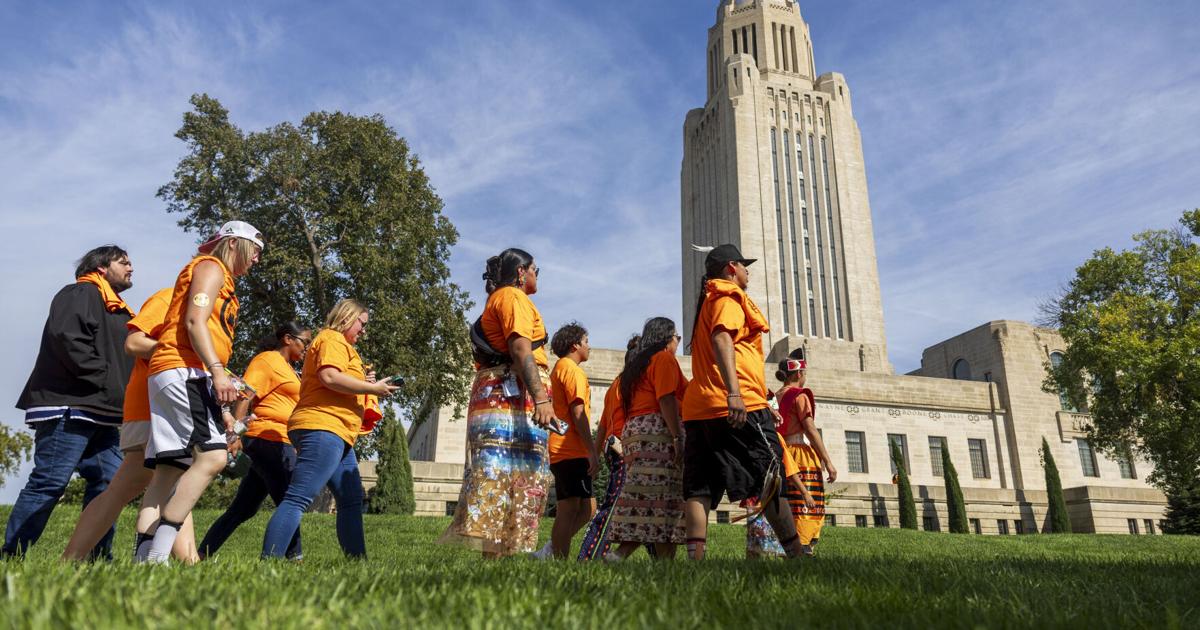
The deep sounds of a traditional Native American prayer song echoed off the front steps of the Nebraska State Capitol as dozens of people stood quietly with their heads bowed, deep in reflection.
Some bore ribbon skirts — known as symbols of resilience, survival and identity for indigenous communities — and beaded earrings and medallions, while nearly each of the more than 100 people of all ages gathered on the north side of the Capitol Tuesday morning wore a neon orange T-shirt, making the group noticeable from blocks away.
The Ponca Tribe of Nebraska’s Domestic Violence Program hosted the annual Every Child Matters Walk, also known as Orange Shirt Day, Tuesday, inviting the Lincoln community to honor the legacy and lessons left behind by Indian boarding schools and the children who attended them by wearing orange.
Indian boarding schools, created by the U.S. government beginning in the late 1800s, removed native children from their families and often sent them hundreds of miles away to attend school, where they were not allowed to speak their language or practice their culture. For decades, indigenous children were humiliated, abused or even killed under the motto “Kill the Indian in him, save the man.”
But Orange Shirt Day, celebrated nationwide and in Canada, aims to uplift the stories of survivors, recognize the generational trauma caused by these schools and spread awareness to prevent future harm to indigenous children, according to Brook McCurdy, the outreach coordinator for the Ponca Tribe of Nebraska.
“It’s really just a symbol that we’re here, our culture is well and alive and our language is coming back,” she said. “It’s a testament to the resiliency of our native communities.”
The international event was originally inspired by the story of Phyllis Webstad, who attended an Indian boarding school when she was 6 years old. On her very first day at the school, she proudly wore the brand new, shiny orange shirt her grandmother bought with the little money she had.
Upon arrival at school, Webstad was stripped down and her clothes were taken away — the orange shirt stolen from her.
In that moment, Webstad felt worthless and invisible, she wrote in a message posted by the Orange Shirt Society. For years after, she despised the color orange. It was a painful reminder of what she had endured, what those before her had experienced and even died at the hands of.
Listen now and subscribe: Apple Podcasts | Spotify | RSS Feed | SoundStack | All Of Our Podcasts
“But now, it’s a symbol,” McCurdy said.
Orange Shirt Day was created in Canada 12 years ago and has taken place every year since on Sept. 30. Lincoln has participated in the event for around three years.
For Summer Copeland, a member of Nebraska’s Omaha tribe, the event is a time of reflection and education. It’s a day to spread awareness and remember their ancestors’ strength and resiliency.
Copeland, who serves as a board member for the Genoa Indian School in Nebraska, is the direct descendent of Indian boarding school survivors, including her great-great grandfather. Additionally, her mother was taken from her tribe as a child and placed in an abusive nonindigenous home as part of a 1950s child removal act, causing her to lose all touch with her culture.
As a result, Copeland’s mother spent part of her young adult life battling drug and alcohol addiction, which led to her own children — Copeland and her two brothers — to later be placed in the same home, causing “another cycle of trauma.”
The intergenerational trauma from these experiences has been long-lasting and injurious, according to Copeland.
“It’s something that our people deal with to this very day and will continue to do so,” she said.
Indian boarding schools are far from a foreign concept in Nebraska.
Genoa, a town of just under 900 people northwest of Lincoln, was home to one of the largest Indian boarding schools in the nation. The Genoa Indian School was created by the federal government in 1884 as a way to “assimilate (indigenous students) into American society.” The nearly 600 students at the school came from more than 10 states and over 40 different tribal nations.
“It’s closer than a lot of people think,” said Thomas Wright, the Domestic Violence Program supervisor for the Ponca Tribe of Nebraska.
Reach Jenna Ebbers at 402-473-2657 or jebbers@journalstar.com.
Love
0
Funny
0
Wow
0
Sad
0
Angry
0
Get local news delivered to your inbox!
Subscribe to our Daily Headlines newsletter.
* I understand and agree that registration on or use of this site constitutes agreement to its user agreement and privacy policy.
Jenna Ebbers
K-12 education reporter
Get email notifications on {{subject}} daily!
Your notification has been saved.
There was a problem saving your notification.
{{description}}
Email notifications are only sent once a day, and only if there are new matching items.
Followed notifications
Please log in to use this feature
Log In
Don’t have an account? Sign Up Today



